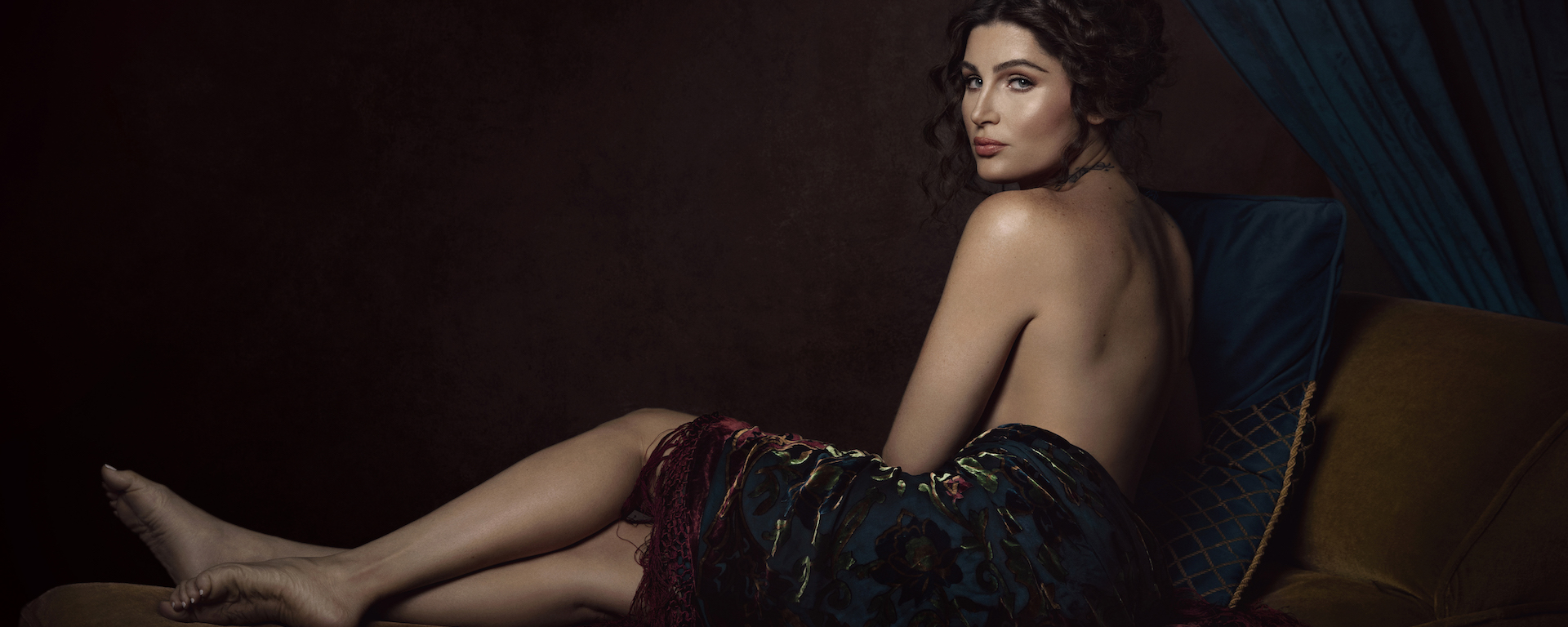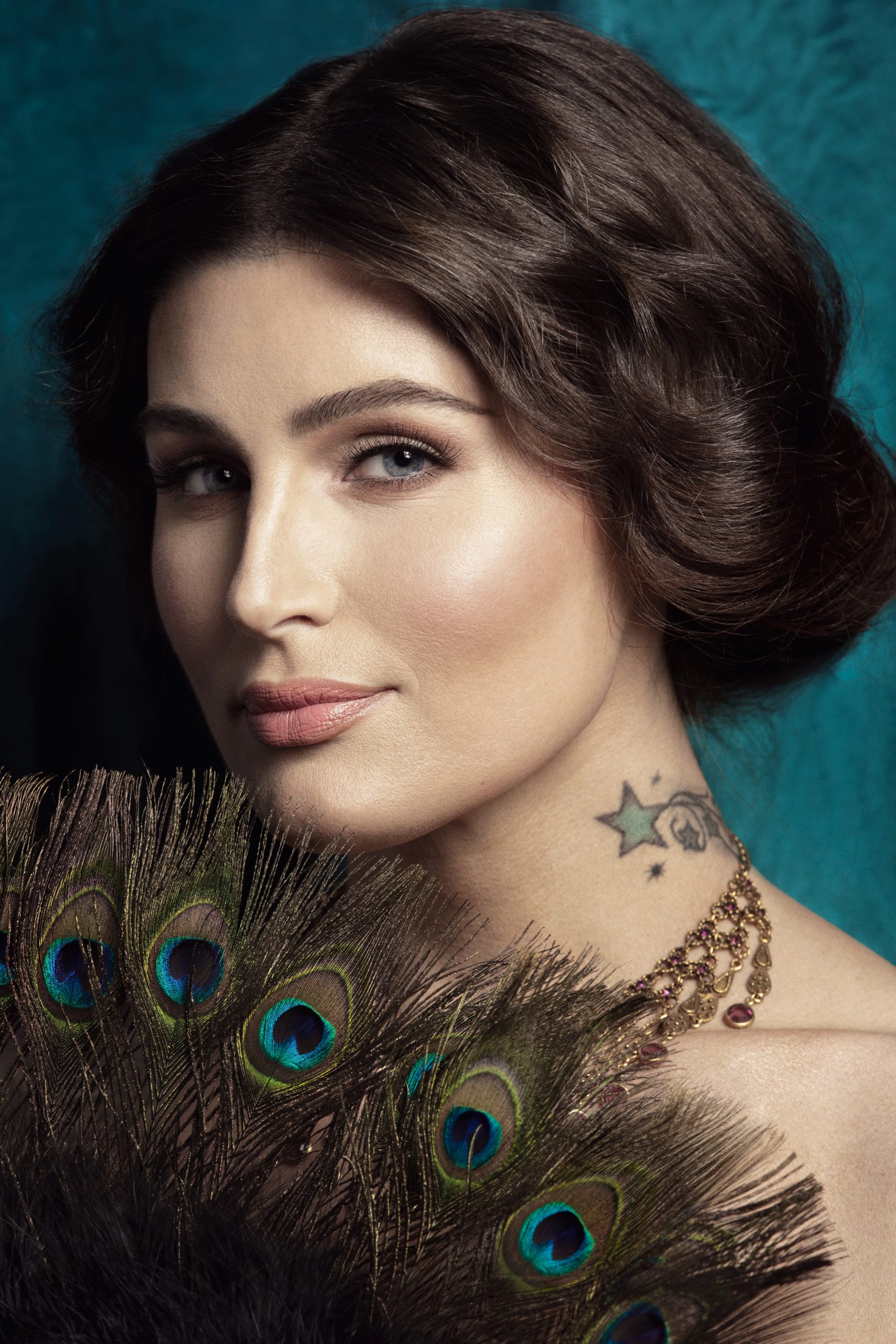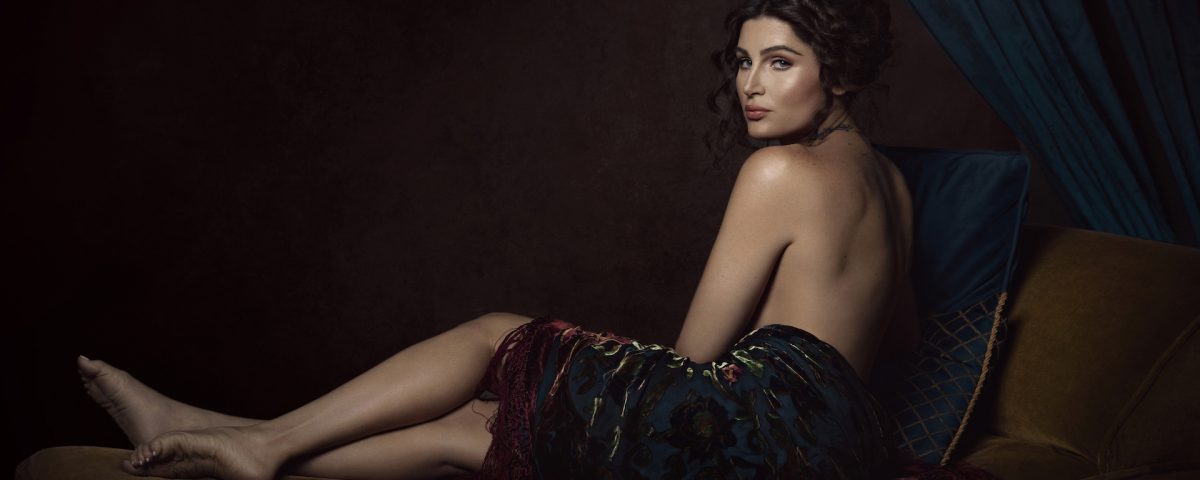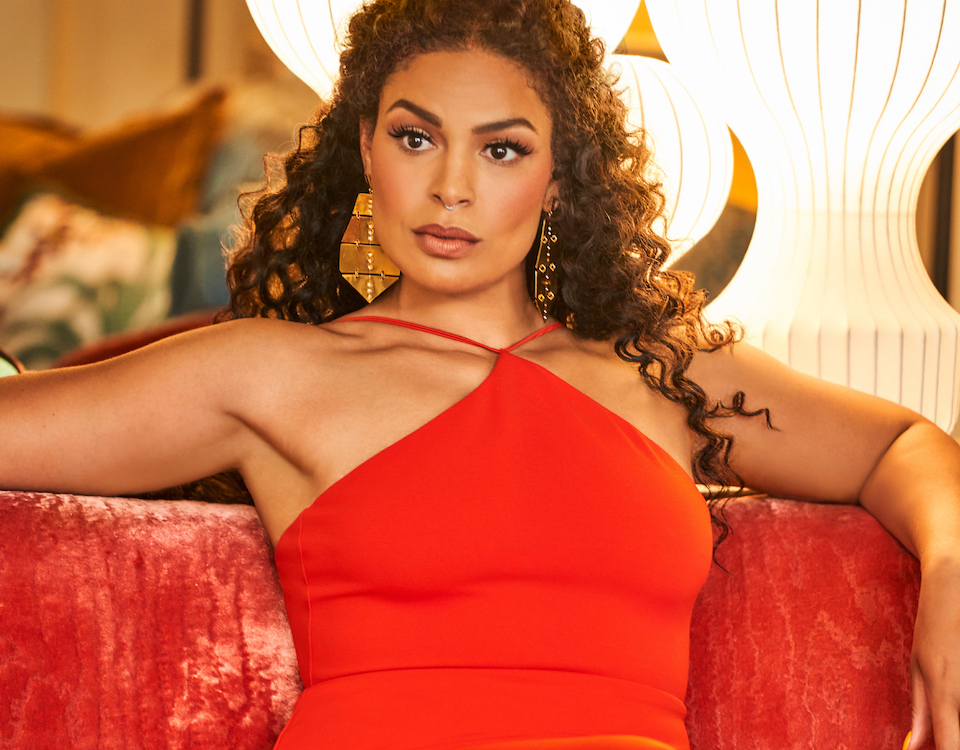
TRACE LYSETTE BLAZES TV,
FILM TRAILS

BY TOMÁS ROMERO
20 JANUARY 2020
From Her Breakout Role On Amazon’s Emmywinning Transparent To Rubbing Shoulders
On The Red Carpet With Her Hustlers Costars Jennifer Lopez, Cardi B, And Lizzo,
Trace Lysette Is Blazing Trails and Dancing Into People's Hearts.

FIND LIKE-MINDED PEOPLE; YOU CAN LIFT
EACH OTHER UP. THAT WOULD BE MY ADVICE,
FIND YOUR TRIBE
From her breakout role on Amazon’s Emmy-winning Transparent to rubbing shoulders on the red carpet with her Hustlers co-stars Jennifer Lopez, Cardi B, and Lizzo, Trace Lysette is blazing trails and dancing into people's hearts. Her highly successful year included roles in the Emmy-nominated pose and the critically acclaimed David makes man. Lysette says she’s most proud of the groundbreaking work she’s done with friends and fellow LGBTQ advocates Laverne Cox and Candis Cayne to help change the way the industry views the trans experience both on-screen and off. Currently honing her producing skills and developing a TV series about a white, working-class trans woman with an unconventional life — something to which she says she can definitely relate — Lysette is on the cusp of superstardom. Ebby Magazine’s Arts & Culture Editor, Tomás Romero caught up with Hollywood’s hardest working multi-hyphenate after a recent photoshoot in downtown Los Angeles.
Tomás Romero: Thanks for chatting with me today, Trace. This being our first issue of the new year, we’re focusing a lot on new beginnings. So, talk to me about some of the changes you’d like to make in the new year?
Trace Lysette: Well, I’ve been thinking a lot about pay equity. I’m so grateful to do what I do for a living, especially coming from where I come from, but I do think that one goal of mine would be to kind of get the financials to match up. It’s nice to accumulate all of this work and acting credits and have all of this stuff on paper that you’ve accomplished, but at the end of the day, we all just want to feel safe. So, I think for me, it’s all about trying to find that project that makes me feel safe. And part of that is tied into financial security and being able to take care of my mother, and just feeling like I can focus on the art, instead of being in survival mode all the time, which has become my norm.
TR: Does your mom live out here in Los Angeles?
TL: No. My mother lives in Dayton, Ohio.
TR: Oh, is that where you’re from?
TL: You know, that’s an interesting question. [laughs] A loaded question. When people ask me that I’m always like: Oh, does that mean I have to pick one place? [laughs] I spent half my life there, growing up in Dayton, Ohio, and then I left and spent the majority of my late teens and adulthood in New York City. Brooklyn, Harlem, I was there by myself, estranged from my family. So, I guess I consider myself one part New Yorker, one part small-town Ohioan. TR: So you’ve reconnected with your mom?
TL: Oh yeah, we’re good now. She’s a great lady. TR: I have a 10-year-old daughter, and she was asking me the other day about parents who, for lack of a better word, shun their kids for being LGBTQ. She legitimately couldn’t understand how parents could do that. It just did not compute. And I think a lot of that is because her generation is so totally chill with LGBTQ issues.
TL: Right. Definitely. TR: For instance, there is a boy in her class, and he’s like: ‘I’m gay.’ And everyone is like: ‘Cool. Who cares?’ It’s kind of amazing. What do you think, are things actually changing?
TL: I think it’s wonderful. I’m actually kind of envious of this generation and how much more accepting they are — that’s not to say that there’s not still a long way to go, especially in other parts of the country — but, by and large, it’s a much different landscape than the one my peers and I were navigating in the 1980s and ’90s. I mean, I remember literally fighting for my life back then. It was the norm. Fighting at school or in my front yard, being followed home, being expelled because you were called a faggot or whatever the case may be. We were literally fighting for our existence. And I’m sure that still goes on. That’s why GLAAD pushes Spirit Day so hard because bullying is still an epidemic. But I am definitely encouraged by the new generation and how much they know and how much they are teaching us. I feel like there is a lot to be learned from them. TR: You’ve talked before about making sure you enjoy your success. You know, taking a moment to stop, look at the big picture, and just say: ‘Man, this is cool.’ How do you hang onto that feeling?
TL: Well, I think it’s just about trying to practice gratitude. I mean, look, I don’t know how long I’m going to keep this train running. [laughs] I’m just doing the best that I can. I go from gig to gig, and I think that I’m lucky to be a TV star or movie star or whatever you want to call it. So, I just try to live in the moment and just stop and smell the roses. Because I don’t want to just blink and have it all pass me by, you know? This industry is so fickle sometimes, and none of us ever really know how long we’ll be able to do what we do. I’ve seen people come and go in the blink of an eye, and sometimes success comes when people aren’t ready for it. I’ve seen people have things handed to them, find success quicker than others, and I’ve seen others that never get it at all. I don’t know, I just try to zoom out and look at life like: ‘Hey. Do I have my health? Yes. Do I have friends? Yes, I have friends. I have my mother. I have a trans mother who loves me very deeply. I’m good.’ TR: What do you mean by the term trans mother? Is your mother trans as well?
TL: One of my mothers is trans, yes. She’s my chosen mother of sorts. When my biological mother and I were estranged, that’s when I formed a bond with my other mother. That’s actually pretty common for girls in my generation. But you guys don’t know this because they don’t let us tell our stories. But maybe one day... TR: Yeah. I hope so. Would you say a trans mother is a sort of like the Davina character played by Alexandra Billings on Transparent? She seemed to have sort of a motherly relationship with your character on the show, is that what you’re talking about?
TL: Um, yeah. That would be kind of a similar situation, although I think of their bond as being a little more sisterly. But yes, very similar. TR: So, it’s almost like a trans mentor?
TL: Yeah. TR: Wow. And that’s a pretty common thing?
TL: For my generation, it was. I don’t know how much it goes on nowadays, but back when we were trying to get by and find acceptance, a lot of times, you had to find it in the LGBTQ community because your biological family couldn’t always deliver. TR: That’s really cool. But, I would guess that trans women must have had it even harder in her generation, right?
TL: Oh, I would imagine in the 70s and 80s it was probably pretty tough. There was definitely a shift in the 2000s once transgender became a word and a topic. TR: For sure. Shifting gears a bit, what words do you live by? Do you have a slogan or anything that pushes you through the hard times when you’re facing a challenge?
TL: I don’t know if it’s a slogan, but I try to think about my adolescence and my experiences in my twenties being a young trans woman prior to trans even being mentioned in the national or global conversation. I try and remind myself that my generation of trans women are survivors, and no matter what I go through in my career, nothing can even come close to some of the things I’ve been through in my youth.
Trace Lysette: Well, I’ve been thinking a lot about pay equity. I’m so grateful to do what I do for a living, especially coming from where I come from, but I do think that one goal of mine would be to kind of get the financials to match up. It’s nice to accumulate all of this work and acting credits and have all of this stuff on paper that you’ve accomplished, but at the end of the day, we all just want to feel safe. So, I think for me, it’s all about trying to find that project that makes me feel safe. And part of that is tied into financial security and being able to take care of my mother, and just feeling like I can focus on the art, instead of being in survival mode all the time, which has become my norm.
TR: Does your mom live out here in Los Angeles?
TL: No. My mother lives in Dayton, Ohio.
TR: Oh, is that where you’re from?
TL: You know, that’s an interesting question. [laughs] A loaded question. When people ask me that I’m always like: Oh, does that mean I have to pick one place? [laughs] I spent half my life there, growing up in Dayton, Ohio, and then I left and spent the majority of my late teens and adulthood in New York City. Brooklyn, Harlem, I was there by myself, estranged from my family. So, I guess I consider myself one part New Yorker, one part small-town Ohioan. TR: So you’ve reconnected with your mom?
TL: Oh yeah, we’re good now. She’s a great lady. TR: I have a 10-year-old daughter, and she was asking me the other day about parents who, for lack of a better word, shun their kids for being LGBTQ. She legitimately couldn’t understand how parents could do that. It just did not compute. And I think a lot of that is because her generation is so totally chill with LGBTQ issues.
TL: Right. Definitely. TR: For instance, there is a boy in her class, and he’s like: ‘I’m gay.’ And everyone is like: ‘Cool. Who cares?’ It’s kind of amazing. What do you think, are things actually changing?
TL: I think it’s wonderful. I’m actually kind of envious of this generation and how much more accepting they are — that’s not to say that there’s not still a long way to go, especially in other parts of the country — but, by and large, it’s a much different landscape than the one my peers and I were navigating in the 1980s and ’90s. I mean, I remember literally fighting for my life back then. It was the norm. Fighting at school or in my front yard, being followed home, being expelled because you were called a faggot or whatever the case may be. We were literally fighting for our existence. And I’m sure that still goes on. That’s why GLAAD pushes Spirit Day so hard because bullying is still an epidemic. But I am definitely encouraged by the new generation and how much they know and how much they are teaching us. I feel like there is a lot to be learned from them. TR: You’ve talked before about making sure you enjoy your success. You know, taking a moment to stop, look at the big picture, and just say: ‘Man, this is cool.’ How do you hang onto that feeling?
TL: Well, I think it’s just about trying to practice gratitude. I mean, look, I don’t know how long I’m going to keep this train running. [laughs] I’m just doing the best that I can. I go from gig to gig, and I think that I’m lucky to be a TV star or movie star or whatever you want to call it. So, I just try to live in the moment and just stop and smell the roses. Because I don’t want to just blink and have it all pass me by, you know? This industry is so fickle sometimes, and none of us ever really know how long we’ll be able to do what we do. I’ve seen people come and go in the blink of an eye, and sometimes success comes when people aren’t ready for it. I’ve seen people have things handed to them, find success quicker than others, and I’ve seen others that never get it at all. I don’t know, I just try to zoom out and look at life like: ‘Hey. Do I have my health? Yes. Do I have friends? Yes, I have friends. I have my mother. I have a trans mother who loves me very deeply. I’m good.’ TR: What do you mean by the term trans mother? Is your mother trans as well?
TL: One of my mothers is trans, yes. She’s my chosen mother of sorts. When my biological mother and I were estranged, that’s when I formed a bond with my other mother. That’s actually pretty common for girls in my generation. But you guys don’t know this because they don’t let us tell our stories. But maybe one day... TR: Yeah. I hope so. Would you say a trans mother is a sort of like the Davina character played by Alexandra Billings on Transparent? She seemed to have sort of a motherly relationship with your character on the show, is that what you’re talking about?
TL: Um, yeah. That would be kind of a similar situation, although I think of their bond as being a little more sisterly. But yes, very similar. TR: So, it’s almost like a trans mentor?
TL: Yeah. TR: Wow. And that’s a pretty common thing?
TL: For my generation, it was. I don’t know how much it goes on nowadays, but back when we were trying to get by and find acceptance, a lot of times, you had to find it in the LGBTQ community because your biological family couldn’t always deliver. TR: That’s really cool. But, I would guess that trans women must have had it even harder in her generation, right?
TL: Oh, I would imagine in the 70s and 80s it was probably pretty tough. There was definitely a shift in the 2000s once transgender became a word and a topic. TR: For sure. Shifting gears a bit, what words do you live by? Do you have a slogan or anything that pushes you through the hard times when you’re facing a challenge?
TL: I don’t know if it’s a slogan, but I try to think about my adolescence and my experiences in my twenties being a young trans woman prior to trans even being mentioned in the national or global conversation. I try and remind myself that my generation of trans women are survivors, and no matter what I go through in my career, nothing can even come close to some of the things I’ve been through in my youth.

TR: So, do you ever look back at your past now and think you’ve made it?
TL: I don’t feel like I’ve made it, but I feel like my existence, and the fact that I’m even alive today, is revolutionary. I don’t like to always recount my trauma in every interview, but if I write the book on my life one day, people will understand what I’m referencing. But yeah, I think it’s important for us to be ready to receive stories from trans women who are my age, who transitioned in the 90s because it’s a very unique story. It’s a very important time in our history where being trans was not something that you really talked about because we didn’t have the language or the tolerance or even the resources for it that we do today. So, I just try to remind myself where I come from, you know? TR: Definitely. Along those same lines, what do you do to feed your soul? Is there anything that really zens you out?
TL: Music. Music totally zens me out. I’m really big on Sade, and Stevie Nicks. I like Stevie Nicks a lot! And Lana del Rey. Ari Lennox and Summer Walker are two of my new faves, also, Lizzo. But yeah, the music I like tends to be the soundtrack of how I’m feeling and can get me through the day to day. I also like to lift weights and get some of my aggression out that way too. [laughs] I don’t know if that’s zen, but it definitely puts me in a better place after I do it. I also like to hike. TR: If you could go back in time, what advice would you give your 10yearold self?
TL: I think I would tell them to experiment more with the arts. I would encourage them to take that piano lesson, well, we didn’t have money, so what am I saying? [laughs] I would try to tell them to find a way to get into the arts because I didn’t know that that was even an option where I came from. I didn’t know that that’s something that I could explore or end up doing for a living. I didn’t take my first acting class until I was 26. So, I would tell my younger self to find the arts and try and nurture that pathway a little bit. That would have been huge for me. I think that if I found the arts sooner, I could maybe have avoided a lot of things that I fell into in young adulthood that was survivalbased, you know? Things that I had to endure to kind of keep afloat. TR: Speaking of the arts, what other artistic avenues are you exploring right now? Singing? painting? Dance?
TL: I’m interested in all of it, actually. I’m particularly interested in exploring music sooner or later, I guess I’m just kind of late bloomer in a lot of ways. [laughs] Many ways! I definitely have always had that artistic streak in me and acting was kind of the first thing that picked me. So, that’s why I’ve been doing it as a profession, but yeah, I’m definitely open to exploring my artistic side and figuring out what else I have in there. I played sports a lot as a kid, whatever was available was what I did, and I think I’m still catching up on the artistic side. TR: Speaking of music, I was so bummed you didn’t have a solo number in the Transparent musicale Finale last year. I was dying to hear your character Shea and Josh (Jay Duplass) sing a duet!
TL: Oh my God, that would have been amazing! I would have loved to have sung a song with Jay! TR: Talk to me about Transparent a bit. Your character was so great, and I don’t think I’ve ever seen a relationship like the one Shea and Josh shared on TV before. It was beautifully done.
TL: Yeah, that was wonderful. Season three, episode six. people come up to me all the time and talk to me about that episode and how special it was. After that, I really felt like I had the confidence to know for sure that I’m supposed to be here doing this acting thing, you know? I mean, I knew it, but the world had never seen the range of my craft before because I’d never been given a shot like that before. So, I was excited that I got to kind of lead that episode and for a change, show the world what I was capable of. Jay was such a gracious costar and we just had the best time. We shot that episode up in Palmdale, and the elements were very harsh, but I remember thinking: ‘Oh, this is a master class in acting. If we can get something out of this, then I can do anything.’[laughs] TR: Nice!
TL: And we got it! We got a lot of good stuff, and it was just a really beautiful episode. I cherish it. But it’s been a challenge getting back to that amount of dialogue in my work. Hopefully, 2020 will have some really juicy roles for me to dive into in a similar way. TR: I’m sure it will. So, it sounds like Transparent was a really good thing for you?
TL: Yeah. It definitely put me on the map. But it is a little bit challenging being a guest star sometimes because you never really know what’s going on and when they’re gonna need you. It’s a different vibe being a guest star. So, it would be nice to kind of find that show that maybe I could call home for a while as a series regular. I think I’ve been craving that feeling of sort of finding my TV family, so to speak, or that project that just makes it all worth it. But yeah, Transparent was good! TR: You’ve accomplished a lot in a pretty short time. What are you most proud of?
TL: I think I’m most proud of the doors that myself and maybe Laverne Cox and Candis Cayne and others have opened for trans people that have come into the industry after us. Candis and Laverne kind of kicked open the door for me, and I feel like Transparent was also a continuation of that. As a result, the landscape has really changed a lot, and I think that’s beautiful. It’s not easy being a pioneer, so I think that’s something that I’m proud of, being one of the first people to help kick open those doors. I was also really proud of Hustlers earlier this year because it was a major movie, and I got to play a character that wasn’t even specifically trans. That was kind of pioneering as well. I don’t know, maybe someday somebody will take note of all that [laughs], but in the meantime, I’m still proud of what I’ve accomplished. TR: Representation is so important right now, especially for kids. Who were the people you looked up to when you were younger? Was there anyone who you saw onscreen and said: ‘Wow! That’s me!’?
TL: No! [laughs] I’m still waiting for that, actually. That’s why I’m developing a TV series right now with a friend of mine. So that I can see myself. It’s about a white, workingclass, trans woman from an urban area who has had a very unconventional life and is a survivor. I’m still waiting to see that. TR: Well, the cool thing is that, whether you realize it or not, you are that person to lots of kids out there right now.
TL: Thanks. TR: Shifting gears again, when do you feel the most ‘in the zone?
TL: probably when I’m on set. That’s when I feel like I’m the most dialedin. I feel like I’m a performer first, and that’s where I feel the best when I’m on set between ‘Action’ and ‘Cut.’ TR: What thing would you give up in an instant if it got you to a better place?
TL: Oh, man, that’s a tough one. I wish I could get rid of all of the toxic doubt that has been placed upon me by society when I was a child.
TL: I don’t feel like I’ve made it, but I feel like my existence, and the fact that I’m even alive today, is revolutionary. I don’t like to always recount my trauma in every interview, but if I write the book on my life one day, people will understand what I’m referencing. But yeah, I think it’s important for us to be ready to receive stories from trans women who are my age, who transitioned in the 90s because it’s a very unique story. It’s a very important time in our history where being trans was not something that you really talked about because we didn’t have the language or the tolerance or even the resources for it that we do today. So, I just try to remind myself where I come from, you know? TR: Definitely. Along those same lines, what do you do to feed your soul? Is there anything that really zens you out?
TL: Music. Music totally zens me out. I’m really big on Sade, and Stevie Nicks. I like Stevie Nicks a lot! And Lana del Rey. Ari Lennox and Summer Walker are two of my new faves, also, Lizzo. But yeah, the music I like tends to be the soundtrack of how I’m feeling and can get me through the day to day. I also like to lift weights and get some of my aggression out that way too. [laughs] I don’t know if that’s zen, but it definitely puts me in a better place after I do it. I also like to hike. TR: If you could go back in time, what advice would you give your 10yearold self?
TL: I think I would tell them to experiment more with the arts. I would encourage them to take that piano lesson, well, we didn’t have money, so what am I saying? [laughs] I would try to tell them to find a way to get into the arts because I didn’t know that that was even an option where I came from. I didn’t know that that’s something that I could explore or end up doing for a living. I didn’t take my first acting class until I was 26. So, I would tell my younger self to find the arts and try and nurture that pathway a little bit. That would have been huge for me. I think that if I found the arts sooner, I could maybe have avoided a lot of things that I fell into in young adulthood that was survivalbased, you know? Things that I had to endure to kind of keep afloat. TR: Speaking of the arts, what other artistic avenues are you exploring right now? Singing? painting? Dance?
TL: I’m interested in all of it, actually. I’m particularly interested in exploring music sooner or later, I guess I’m just kind of late bloomer in a lot of ways. [laughs] Many ways! I definitely have always had that artistic streak in me and acting was kind of the first thing that picked me. So, that’s why I’ve been doing it as a profession, but yeah, I’m definitely open to exploring my artistic side and figuring out what else I have in there. I played sports a lot as a kid, whatever was available was what I did, and I think I’m still catching up on the artistic side. TR: Speaking of music, I was so bummed you didn’t have a solo number in the Transparent musicale Finale last year. I was dying to hear your character Shea and Josh (Jay Duplass) sing a duet!
TL: Oh my God, that would have been amazing! I would have loved to have sung a song with Jay! TR: Talk to me about Transparent a bit. Your character was so great, and I don’t think I’ve ever seen a relationship like the one Shea and Josh shared on TV before. It was beautifully done.
TL: Yeah, that was wonderful. Season three, episode six. people come up to me all the time and talk to me about that episode and how special it was. After that, I really felt like I had the confidence to know for sure that I’m supposed to be here doing this acting thing, you know? I mean, I knew it, but the world had never seen the range of my craft before because I’d never been given a shot like that before. So, I was excited that I got to kind of lead that episode and for a change, show the world what I was capable of. Jay was such a gracious costar and we just had the best time. We shot that episode up in Palmdale, and the elements were very harsh, but I remember thinking: ‘Oh, this is a master class in acting. If we can get something out of this, then I can do anything.’[laughs] TR: Nice!
TL: And we got it! We got a lot of good stuff, and it was just a really beautiful episode. I cherish it. But it’s been a challenge getting back to that amount of dialogue in my work. Hopefully, 2020 will have some really juicy roles for me to dive into in a similar way. TR: I’m sure it will. So, it sounds like Transparent was a really good thing for you?
TL: Yeah. It definitely put me on the map. But it is a little bit challenging being a guest star sometimes because you never really know what’s going on and when they’re gonna need you. It’s a different vibe being a guest star. So, it would be nice to kind of find that show that maybe I could call home for a while as a series regular. I think I’ve been craving that feeling of sort of finding my TV family, so to speak, or that project that just makes it all worth it. But yeah, Transparent was good! TR: You’ve accomplished a lot in a pretty short time. What are you most proud of?
TL: I think I’m most proud of the doors that myself and maybe Laverne Cox and Candis Cayne and others have opened for trans people that have come into the industry after us. Candis and Laverne kind of kicked open the door for me, and I feel like Transparent was also a continuation of that. As a result, the landscape has really changed a lot, and I think that’s beautiful. It’s not easy being a pioneer, so I think that’s something that I’m proud of, being one of the first people to help kick open those doors. I was also really proud of Hustlers earlier this year because it was a major movie, and I got to play a character that wasn’t even specifically trans. That was kind of pioneering as well. I don’t know, maybe someday somebody will take note of all that [laughs], but in the meantime, I’m still proud of what I’ve accomplished. TR: Representation is so important right now, especially for kids. Who were the people you looked up to when you were younger? Was there anyone who you saw onscreen and said: ‘Wow! That’s me!’?
TL: No! [laughs] I’m still waiting for that, actually. That’s why I’m developing a TV series right now with a friend of mine. So that I can see myself. It’s about a white, workingclass, trans woman from an urban area who has had a very unconventional life and is a survivor. I’m still waiting to see that. TR: Well, the cool thing is that, whether you realize it or not, you are that person to lots of kids out there right now.
TL: Thanks. TR: Shifting gears again, when do you feel the most ‘in the zone?
TL: probably when I’m on set. That’s when I feel like I’m the most dialedin. I feel like I’m a performer first, and that’s where I feel the best when I’m on set between ‘Action’ and ‘Cut.’ TR: What thing would you give up in an instant if it got you to a better place?
TL: Oh, man, that’s a tough one. I wish I could get rid of all of the toxic doubt that has been placed upon me by society when I was a child.





